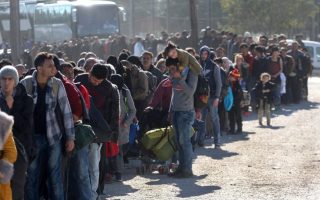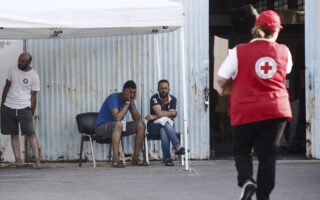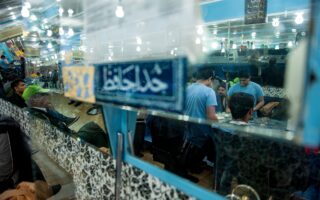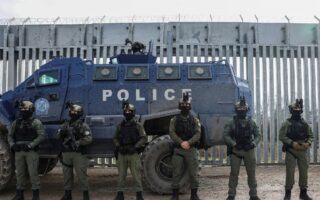Two cases for citizenship: What does it mean to be a Greek?

A summer ago, I was in a fancy shop on Ermou Street in Athens. I was on the hunt for a birthday gift for my cousin. In the store were two gorgeous and welcoming women, both wanting to assist me on my quest. One was white. One was black. Both spoke pristine Greek. They seemed to be good friends.
I engaged them and was struck by the black woman and her command of the language. (And for the record, I am equally struck by the same if Greek is spoken by an Asian person or by anyone else who is not Greek.) Immediately after the words left my mouth, though (and I wish I had a butterfly net to catch them before flying into the air), I asked the black woman where she was from. She cocked her head to one side, looking at me as if I was crazy. (Not crazy, but stupid and insensitive.) She smiled broadly as she said: “I am from here. I am Greek.”
Well, of course she is Greek. She is as Greek as me, in fact. She is as Greek as anyone else who was born in the country, educated in the country, speaks the language, has known no other country, has invested in the country. Has loved the country. But this woman lacks citizenship like so many others, who possess all the same cultural qualities.
This defies understanding on so many levels.
What makes “a Greek” and what does it take to become a citizen of this small, great country? It is frustrating and so is the bureaucracy that is legendary in Greece, which often prohibits efficiency, modernity, and progress forward post haste.
Why is it, with ease, that the government grants honorary citizenship to authors, academics, actors and philanthropists, handed out like candy even though they may carry not one drop of Greek blood and only come to Greece to study, write, and vacation. They may not even speak Greek. While these citizens of Greece may give additional prominence to the country and while it may provide them some kind of cachet to have it, they have not invested in the actual growth and operation of the country as the woman I mention who works at the store on Ermou.
As for me, I am Greek-born and an adoptee, taken from Greece as a baby during the Cold War like some 4,000 others. Through no “fault” of our own, we were stripped of our citizenship when we left the country. Our biological parents were born in Greece, citizens of the country. Our first oversized blue passports with the seal of the Hellenic Republic on the front were a one-way passport out of the country, which expired after we used it to travel to new parents. That would have been alright were there an easy, streamlined mechanism in place to simply have it restored as adults should we want to. Hundreds of us, right now, would like to restore our birthright as citizens of Greece by having our passports returned.
Adoptees may not share the same lived experience as the children of refugees and immigrants, but many of the latter, through no “fault” of their own, were also born in Greece, raised in Greece, educated in the country and now have roots solidly in Greece. Why are they excluded from becoming full participants, full citizens in a country that is now home? Many of them may be of a different color or religion, but they are culturally and fully Greek.
Giannis Antetokounmpo is a Greek Nigerian. His parents were refugees and eked out a life here, and, in fact, gave their children, all born here except one, Greek first names. The story of the most famous child, Giannis, amazed me as I watched him grow to prominence and fame, not only as one of the world’s greatest basketball players, but as a good and decent man, a philanthropic person and one of the best ambassadors that Greece has. He became known, as we all know, as the Greek Freak. I remember hearing him speak English with a distinctively Greek accent, so familiar to me. His pride in the country he calls home is touching. He is building a home in the Athens area. He opened a new store at Athens Airport. He is a global figure now, the pride of the Greek diaspora and of the Greeks themselves, many of whom wait for him after his games to cheer him again and to sing the Greek national anthem with him.
What took the government so long to issue him a passport, and to make him a Greek citizen, when he should have been granted one at birth as his parents had already established roots in the country and invested in it with their sweat and toil? It was not until 2013, 19 years after he was born, educated in Greece, trained in Greece to be one of the best basketball players in the world, that he was granted his Greek citizenship.
What’s wrong with this picture? Plenty.
There are so many like Giannis who were born into this society and have spent their lives with Greek friends loving this country and devoting their time and their work to it. Why can’t the government, through a restructured process with careful checks and balances, grant them Greek citizenship? Not everyone will want to stay. Not everyone may want their Greek citizenship, but for those who do, why not?
Citizenship is all about participation and engagement. How can you devote your life to a country and yet not fully be allowed to be a part of it? No citizen in the United States, for example, is harder working and loves that country more than the immigrants and refugees who came to its shores, and who, literally, built the country – and that includes Greek people!
Diversity has its issues, to be sure, but diversity makes a country better and stronger. Embracing people, extending genuine philoxenia, love of the “stranger,” and inviting them, through proper channels, to join the country as active, engaged participants beyond the ability to vote, is not only the right thing to do, but secures the country, creating loyalty and support. “You gave me the opportunity to be here,” the refugee and immigrant would say. “I give you back my love for this country and a promise to work hard to make it stronger and better.” And further, every single one of the refugees and immigrants in Greece today has the potential of the Antetokounmpo brothers. They need to be embraced and to be given a chance to contribute and to flourish.
There are two groups of people who deserve careful consideration for Greek citizenship right now.
First, there are the 4,000 Greek-born adoptees of the Cold War era, born of Greek parents, which they can prove, and who were exported out of the country and stripped of the Greek citizenship they once held. They simply want it restored and believe it is part of their identity and birthright. It is that simple and should not be convoluted by ridiculous arguments about adoptees not being able to fully prove who they are and from whom and where they come.
Citizenship is all about participation and engagement. How can you devote your life to a country and yet not fully be allowed to be a part of it?
Second is the group of people who are children of refugees and immigrants who were born in Greece, live in Greece, have been educated in Greece, work in Greece and speak the language. This is the only country they know. They want the country to be as fully invested in them as they are in the country.
Here is what the Greek law says about citizenship: A person acquires citizenship at the time of birth if the person is born to a person of Greek nationality, the offspring of Greek citizens, even if that parent has not exercised their right to citizenship. In this context, the law says Greek citizenship is an inherent right. A Greek citizen is also a person who is registered in the records of a municipality of the Hellenic Republic. The certificate of registration constitutes legal proof of Greek citizenship.
For Greek-born adoptees the law is clear. We have spent our lives away from our country. Many of us don’t have all the paperwork we need because much of it was destroyed or damaged in the custody of Greek governmental organizations and other social service networks. But we can all prove our birth in Greece and by Greek parents. Both our parents. This is as clear as crystal. So, it should not take years and thousands of dollars to establish identity and to restore that which was taken. That is exactly what is happening now. The Greek government has erected a virtual blockade to break through, and then a maze of trapdoors, and the request for paperwork that is often impossible to obtain after all these years. It’s insane and many of us have waited (patiently) for years.
The government of Kyriakos Mitsotakis should want to right this historical wrong immediately, establish a small task force to confirm identity, produce a way to process applications efficiently, and grant nostos to the Greek adoptees, first, by way of easy and open access to adoption records, then to the restoration of citizenship. This is neither complicated nor difficult to achieve. It should not take an act of God, but only political will and someone to make a decision. Most of us can even produce the blue passport we were issued as babies and children. We’ll trade it for the one that actually means something today.
And what do we contribute to the country after citizenship? (Because we don’t merely want it to make a point.) We want it to reconnect, a connection that defies explanation. We have longed for and thought about a return to our country and culture to water the roots that were ripped apart, to re-establish relationships that were lost and to visit again and again to bring our money, our love, and our appreciation for the country that gave us life. We are proud Greeks and we have always belonged since birth in some way, fundamentally, to Greece.
For the other group, this will take more courage than political will and it will require vision to create a new, diverse, inclusive future for Greece as it already grows and prospers economically, financially, environmentally. I will argue that the true strength of a country is in its demos, its people. They decide the kind of country they want and to whom they entrust governing. Those in power who give the people agency, who have the vision and stamina to solve a more complex social problem, will win hearts and minds in the end. Those in power also need the skill to bring the more skeptical along. Convince them that this way is the best way to a better, stronger, more prosperous Greece.
For the others (refugees and immigrants) who were also born in Greece, but were, notably, educated there, live there, invest in Greece, work in Greece, have friends and family in the country, they deserve a way forward, too, should they want to stay. While it may be more complicated, perhaps more fraught with a few more hurdles to overcome, they should be provided a fair process, too, and one that is efficient, clear, and expedient. Their parents may not be citizens, may never be citizens, but those parents elected to stay in Greece, and were allowed to stay in Greece, a relatively safe country in which to have their children and raise them. Why is there not a process to vet their children, and once vetted, to give them the recognition of citizenship that they deserve?
What makes a citizen?
It is the ability to vote for anyone or anything that offers a prosperous, promising, productive future for the common good. And, more importantly, it is the ability to fully participate in all parts of civic life in the country they call home, and to be embraced by that country in return, which should encourage engagement.
What makes a Greek?
Greeks are born Greek. And Greeks also become Greek by virtue of their time here and their devotion to the country. Also, through education, formal education, and through culture and a common language. This concept is called paideia in Greek, a concept often hard to define, but understood well by Greeks as something that binds people to a community and to the land itself.
Elpida. It is one of the most beautiful words in the Greek language. It means hope. A hopeful country produces hopeful people and can inspire them to dream of a country that has the ability and vision to evolve. To be the best version of itself. To have learned from the past and to be able to adapt, holding fast to the same values, perhaps ancient values, and to continue to practice them.
The Greek philosopher Epictetus once said, “Devote the rest of your life to making progress.” Let’s make some progress now for citizenship. And strengthening democracy in the process.
Dr Mary Cardaras is a writer, journalist and documentary filmmaker, who is the director of The Demos Center at The American College of Greece. [email protected]
www.acg.edu/admissions/study-abroad/the-demos-center-project/





